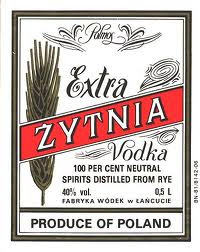The TTABlog reports on a case involving a fairly common type of dispute, between a manufacturer and importer, albeit with a twist. I’ll elaborate a little more on the claim that relates to the ownership of the mark.
The importer was the registrant of the mark ZYTNIA for vodka; the Polish manufacturer filed a petition to cancel the registration. Strike one against the manufacturer was that it brought the cancellation action almost 11 years after the mark was registered, well after incontestablity is established. Incontestability means, of course, that there are limited bases for cancelling a registration, and incorrect ownership isn’t one of them. The manufacturer therefore had to rely on fraud as its basis for cancellation, i.e., the manufacturer
| claims that respondent fraudulently obtained the registration by asserting that it was the owner of the mark when, in point of fact, petitioner owned the mark. Because petitioner has alleged and attempted to establish a willful withholding of ownership information by respondent when it prosecuted the underlying application that matured into the involved registration, the ownership question may be addressed, but only in the context of fraud. |
(italics in original.) Fraud has to be “proven to the hilt,” showing that a statement was false, the falsity was intentional, and that the false statement was material to obtaining or maintaining a registration.
So you be the Board member (these are the facts recited in the opinion; I’m not sure they’re all relevant):
- Where there is no agreement, as between a manufacturer and importer there is a rebuttable presumption that the manufacturer owns a mark
- The importer or its predecessor-in-interest has been importing the vodka since 1960
- The vodka is made using the importer’s recipe
- Total sales from 2000-2009 were $3.75M
- There are current annual sales of $400K-$600K
- The importer is the exclusive importer and distributor of the vodka produced under the ZYTNIA mark
- The label says “Produced for and Imported by [importer]”
- The petition to cancel was filed on August 4, 2005
- A September or November, 2005 agreement says that the vodka will be made using the importer’s recipe
- The contract says the importer promises not to introduce to the American market any alcoholic beverages manufactured in Poland or abroad whose name includes the word ‘żytnia,’ or ‘zytnia’ [rye] in any form
- There is an unexecuted document “coming out of the understanding from the contract dated 27th of September, 2005, the agreement to transfer the trademark and the right to the trademark,” that would have transferred the mark from the importer to the manufacturer, but the parties could not come to an agreement on compensation so the agreement was never signed
- The parties continue to do business with each other, as they have for years
- The manufacturer owns foreign registrations for EXTRA ZYTNIA
What’s your verdict? Kind of a trick question, remember the manufacturer has to prove fraud, not just who the owner should be. That makes it an easy case:
| Given these facts, it is unreasonable to infer that respondent filed the application with intent to deceive the Office as to ownership. Even if we were to find that petitioner were the owner of the mark, cancellation on the ground of ownership is not permissible inasmuch as the petition was filed long after the five-year anniversary date of the registration. |
What if the manufacturer didn’t have to prove fraud, just incorrect ownership? Personally, I think this is the rarer case where the importer wins. The Board calls out what I think are the facts that tip the call in the importer’s favor:
| [V]odka is made according to respondent’s recipe; presumably, respondent is the one exercising control over the nature and quality of the ZYTNIA vodka. The labels reflect as much when they indicate “Produced for and imported by [respondent].” Further, it is respondent that advertises and markets the ZYTNIA vodka in the United States. Thus, to the extent that consumer perception may be relevant to ownership, it is likely that the public believes that respondent is responsible for the vodka sold under the mark ZYTNIA. |
Add to it that there was an effort to assign ownership that never materialized. An assignment might make sense from a documentation standpoint, i.e., there is a chain of ownership for the old (and incontestable) registration. If instead the 2005 agreement was styled as a surrender of any claim of ownership, then the registration may be invalid. But styling it as an assignment concedes validity of ownership in the assignor, another nail in the coffin for me.
Either way, at the end of the day no luck for the manufacturer. Just too late.
Slaska Wytwornia Wodek Gatunkowtch “Polmos” SA v. Stawski Dist. Co., Inc., Can. No. 92044806 (TTAB July 27, 2010)

This work is licensed under a Creative Commons Attribution-No Derivative Works 3.0 United States License.

